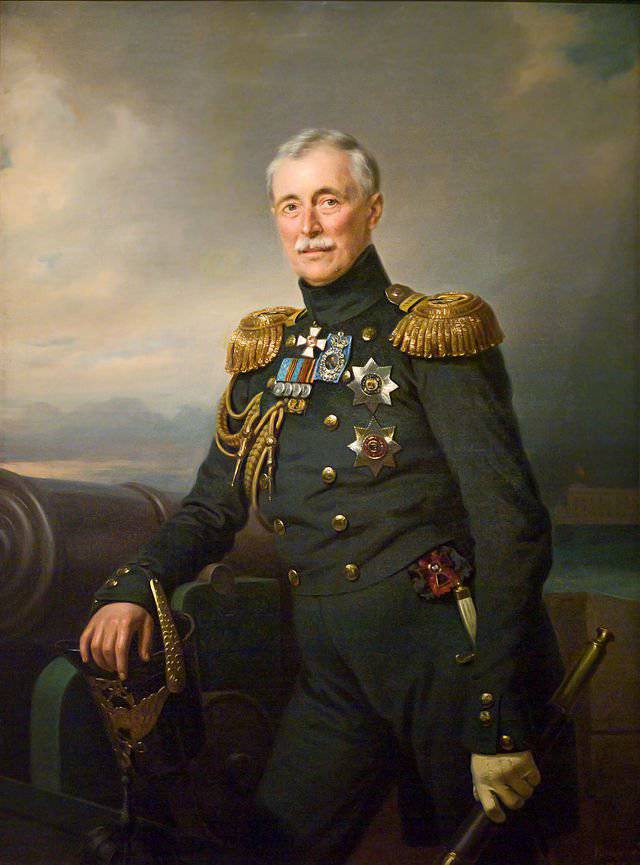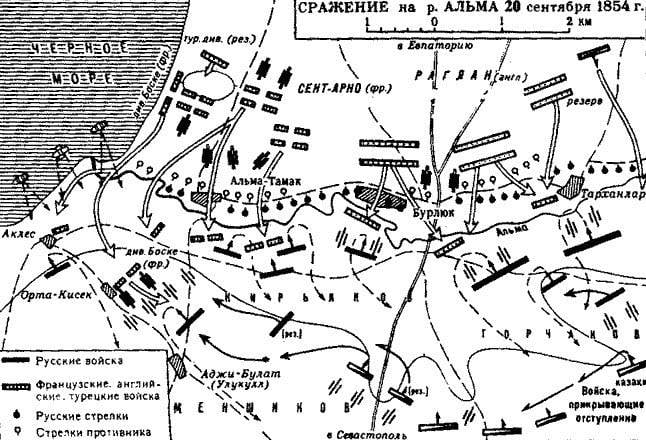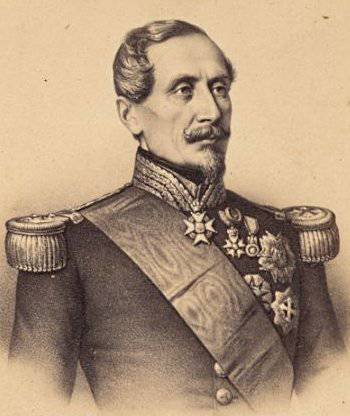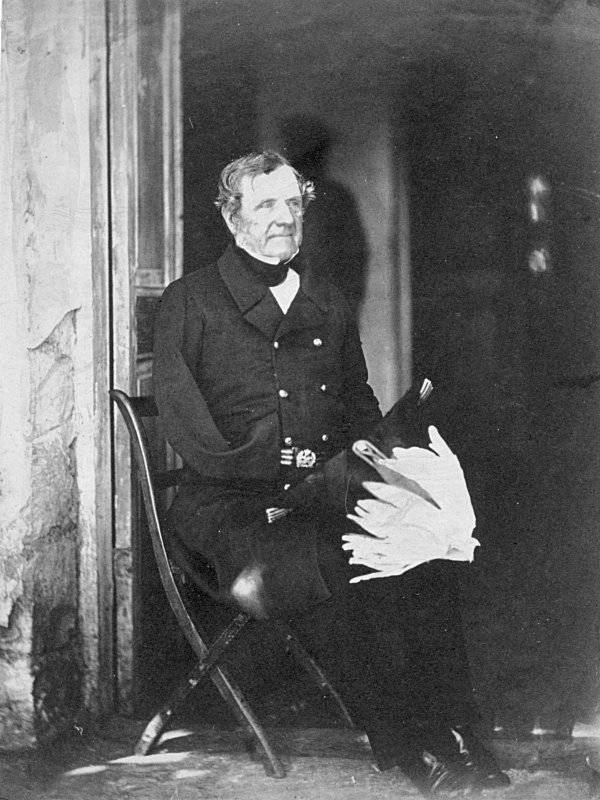The first major land battle in the Crimean War - the battle of Alma
Prehistory Readiness of the Crimea for defense
2 (14) September 1854, the Anglo-French-Turkish Army was landed in Yevpatoriya and, not meeting resistance, moved along the coast to the south, to Sevastopol. This city, the former main base of the Russian Black Sea fleet, was considered the main goal of the allies in the Crimean campaign.
In Russia, including in Sevastopol, with intense attention followed the beginning of the war, the situation in London and Paris, the war on the Danube, the first successes and subsequent failures caused by mistakes and the lack of a clear plan of action for the high command (Danube campaign of the Eastern War). Nakhimov even after the Battle of Sinop was gloomy. He foresaw the intervention of the great European powers in the war between Russia and Turkey. Every day the black cloud was growing over Sevastopol. It became clear to many that the decisive clash between the West and Russia would occur precisely on the Black Sea strategic direction.
On the morning of September 1 (13), 1854, the telegraph informed Menshikov that a huge fleet of allies was heading for Sevastopol. In the distance, Nakhimov from the tower of the naval library observed a huge enemy armada — near the 360 pennants. These were both warships and transports with soldiers, artillery, various kinds of supplies. Kornilov, Nakhimov, Istomin, Totleben, and many other well-known and remaining obscure heroes had to meet the enemy with their breasts, saving Russia with their death. It is they, Russian soldiers and sailors, who will create the great Sebastopol epic, which will eclipse all past sieges. In the Western press, after the end of the war, this miracle will be called the “Russian Troy”. In the conditions of the unpreparedness of the fortifications of Sevastopol to long-term defense, mistakes of the high command and poor organization of the rear, which caused a shortage of ammunition, medicines and everything necessary for the war, they will give the enemy such a terrible rebuff that the military machine of the West will break and Russia will be able to get out of the war with minimal losses .
The commander-in-chief of the Crimean army and the Black Sea Fleet was the great-grandson of Petrovsky’s favorite and the favorite of Tsar Nikolai Alexander Sergeevich Menshikov. He was showered with all possible mercies and enjoyed the special favor of the emperor. Alexander Menshikov was the Chief of the Main Naval Staff and the Navy Ministers, although he never sailed and knew the maritime business purely amateur, studying it on his own. At the same time, Menshikov became governor-general of Finland, although Finland knew even less than maritime business. He possessed enormous wealth and one of the best libraries in Russia, was a very educated person, reading books in different languages. The Menshikov man was intelligent and caustic, clearly noticing the shortcomings of the then dignitaries. Menshikov was undoubtedly a brave man, this was noted when he participated in the Russian-Turkish war in 1809 — 1811, then in the Patriotic War 1812 of the year (for bravery in the Battle of Borodino was promoted to headquarters), foreign campaigns of the Russian army 1813-1814 yy Thus, during the storming of Paris, he was wounded in the leg, for which he was awarded the Order of St. Anne 2 of the 10th degree and a golden sword with the inscription “for bravery”. In the 1828-1829 war, commanding the forces besieging Varna, he was seriously wounded (with both legs in the core).
In 1853, for negotiations with Turkey, he was sent as ambassador extraordinary to Constantinople. However, the negotiations failed. British and French diplomats skillfully failed Russia and the Ottoman Empire to sever relations, and then to war (Trap for Russia. The failure of the mission of Alexander Menshikov). However, despite the versatile talents and brilliant mind, Menshikov was not a commander with a capital letter. This was not the man who could perform the functions of the supreme leader of the Russian land and sea forces, and even in the most dangerous direction. After the Allied fleet entered the Black Sea, Odessa, Sevastopol, and Nikolaev at the start of 1854, all cities and villages along the coast were under threat of attack. However, practically no measures were taken to strengthen the coastal defense. Antiamphibious defense on the most dangerous areas did not create. Even after the bombing of Odessa in April, 1854 did not take decisive action to strengthen the defense of the peninsula.
7 (19) of June, the Russian envoy in Brussels, Count Hreptovich, informed the sovereign about the Allied landing party in the Crimea. 18 (30) June 1854 g. Nikolay notified Menshikov that soon “a strong attack on the Crimea was to be expected ...” 29 June (11 July) 1854 Menshikov himself reported to the king that an attack on Sevastopol was to be expected. He assumed that the enemy would land an 60 thousand army, not counting the Ottomans. And for the defense of the peninsula, Menshikov had about 24 thousand people with 36 light weapons. The prince made a pessimistic conclusion: the temporary fortifications of Sevastopol can repel an unexpected raid, but “... against the correct siege of a numerous enemy and against bombardment from the shore, our defenses will not be commensurate with the means of the besieger ... We will put our bellies in a desperate struggle to protect holy Russia and her right cause. "
In this period, Menshikov alternated moods: either he showed complete indifference and carelessness, then he developed vigorous activity. So, he showed an understanding of the usefulness of underwater mines (Academician Jacobi worked on them), who chained the actions of the Allied fleet in the Baltic, and asked 1854 in February from the head of the maritime ministry Constantine to send to the Crimea one of the officers necessary devices "for the defense of the Sevastopol raid. However, an attempt to protect Sevastopol by mines, unfortunately, failed. Too much time was lost in peacetime and it was not enough for proper experimentation and installation work.
On the other hand, at times Menshikov did not believe at all that the landing of the allies in the Crimea and the siege of Sevastopol was possible. The last such attack Menshikov captured just before the landing of the Allied Army and Alma. So, two days before the landing of the enemy troops in the Crimea, he wrote to General Annenkov that at the present time "landing is impossible." Menshikov considered that the Allies had missed a favorable time for disembarkation, and it would be postponed indefinitely. As a result, Menshikov’s confidants and staff arrived in a good mood, believing that the danger had passed this year. Coldly, Menshikov reacted to the talented military engineer Totleben, who was sent from the Danube Theater by Prince Mikhail Gorchakov. In fact, Menshikov sent him back, but Totleben still managed to stay in Sevastopol, and in the end he saved the city from rapid surrender.
Nonchalance showed and high command, Petersburg. The Crimea did not send large enough units capable of disrupting the landing of the Allied expeditionary army. Resources for this were, for example, completely redundant forces defended the coast of the Baltic Sea (Finland, St. Petersburg and Ostsee provinces), although from this side there was no serious threat the whole war. And this is despite the fact that alarming news came to St. Petersburg about the preparations of the allies for a large sea expedition, about the concentration of numerous transports in Varna. In addition, after the withdrawal of our troops from the Danube principalities, it was possible to transfer the entire army of Gorchakov to the Crimea, and Menshikov would have been able to meet the enemy army with them, but they did not. In St. Petersburg, it was believed that even if the Allies invaded the Crimea, everything would be limited to a brief touch and the Allies would not linger on the peninsula. All this in the end, taking into account the pre-war mistakes in military construction, and led the Russian army to defeat in the Crimea.
Therefore, it is not surprising that the Allies successfully conducted a landing operation. Although amphibious operations have always been and are considered one of the most complex and dangerous military activities. Menshikov learned about the landing of the Allies, when he could do nothing. He did not even think about moving to the landing site. Although even minor connections at the landing site with artillery could produce terrible havoc in the expeditionary army.

Portrait of A.S. Menshikov. German artist Franz Kruger
The ratio of forces and the location of Russian troops
The allied army numbered more than 60 thousand people. A small garrison was left in Evpatoria. Therefore, Alma received about 55 thousand soldiers with 112 guns (according to other data from 144 guns): about 28 thousand French, 21 thousand British and about 6 thousand Ottomans. Menshikov was directly in possession of 37,5 thousand people with 84 guns. In addition, in the eastern part of the peninsula, General Khomutov had about 13 thousand soldiers, and about 20 thousand people were in the naval crews. But they could not take part in the battle. The allied army had not only a numerical advantage, but was also better armed — almost all the soldiers had a choke. In the Russian army, there were few soldiers armed with unions — about 1,6 thousand soldiers.
On September 7, the allies had already reached the Menshikov army and were visible from Russian positions. The Russian commander chose a position on the left bank of the Alma River. A fairly high bank made the position convenient for defense, and in the rear there were heights to which the army could be withdrawn in case of failure. However, the position was too stretched, which, given the superiority of the enemy forces, made it unprofitable. In addition, the left flank could be hit by the enemy fleet, it had to be withdrawn from the coast, which made its position unstable and could lead to a general defeat.
On the right flank, troops were commanded by General Pyotr Dmitrievich Gorchakov (brother of Commander-in-Chief of the Danube Army, Prince M. Gorchakov). He was an experienced and brave commander who participated in almost all wars, starting with the campaign 1808 — 1809. in Finland. Kazan, Vladimir and Suzdal infantry regiments defended Kurgan Hill, fortified with two redoubts. The left flank was led by the commander of the 17 Infantry Division, Vasiliy Yakovlevich Kiriakov. According to the historian of the Crimean War, Tale, it was "... ignorant, completely devoid of any kind of military (or non-military) talents, rarely been in a completely sober state." Under his leadership were the Minsk and Moscow regiments. He was supposed to meet the enemy with fire at the rise from the sea. The left flank reached only to the road to Alma-Tamak. As a result, the section from Almatymak to the sea was not protected, which allowed the enemy to make a bypass maneuver. The center of the position was directly led by Menshikov. Under his hand were Belostok, Brest, Tarutinsky and Borodino infantry regiments. In the center the dominant height was Telegraph Hill. In addition, three rifle battalions were deployed in chains on the right bank of the river. Menshikov did not have a special battle plan, although he was confident of success.

Allied plans. Expeditionary Army Command
The command of the allies, having superior forces, planned to strike simultaneously from the front and bypassing both Russian flanks. On the right attacking wing were French troops, on the left - the British. The Turkish division was in reserve. The frontal attack was led by Marshal Saint-Arnaud, the aim of the French troops was the dominant height of the center - Telegraph Hill. One of the French divisions under the command of General Pierre Francois Bosquet was to bypass the left Russian flank along the sea. He was a brave officer who had served in Algeria for almost two decades, where French troops regularly fought (like Russians in the Caucasus). British troops under the command of Lord Raglan had to bypass the Russian right wing.
The overall command, by virtue of his vast experience, was carried out by the French Marshal Armand Jacques Achille Leroux de Saint-Arnaud. It was a very peculiar personality. The son of a simple citizen was able to rise to the heights of military power. The beginning of his military service was unsuccessful - he was fired for his bad behavior at the request of his company. Given the very rough manners that prevailed in the armies of the time, this was an achievement. Then the unsuccessful soldier sought happiness in England, again in France (already as an actor), then participated in the war of liberation in Greece. But everywhere failed.
Smog with the help of relatives again to enter the French army. However, he deserted, not wanting to go to Guadeloupe (in South America), where he was sent to the regiment. Once again I was able to join the army after the French Revolution 1830 of the year. In 1836, he was transferred to the Algerian Foreign Legion. Saint-Arnaud spent the life of an adventurer and revelers. There was no atrocity before which he would stop, there were no "joys of life" with which he would not undermine his health. However, he showed himself to be a brave soldier. In Algeria, he went a long way from a soldier to a divisional general. In the Algerian Foreign Legion were very hard morals. Arabs were not counted as people. However, even in this wild corner of civilization, Saint-Arno distinguished himself. The detachment of the thugs of Saint-Arno was called the "hell of a column." He allowed the Arabs to kill and rob at the slightest disagreement, but he also kept his soldiers in tight rein, shooting them at the slightest disobedience. Even then, St. Arnaud showed how European civilizers “put things in order”: for example, in Shelas, in 1845, the Arabs were driven into the caves by crowds and let in smoke, killing everyone.
Louis Napoleon, who knew how to choose people, in 1851, summoned him to Paris and appointed him head of the 2 division of the Paris Army, and then as war minister. Louis Napoleon saw a completely unprincipled man in St. Arno. In preparing a coup d'état, the prince-president wanted to have complete confidence that the minister of war would undoubtedly spill rivers of blood. 2 December The 1851 coup d'état was successful and exactly one year later, when the Empire was restored, Napoleon III made Saint-Arnaud a Marshal of France. Saint-Arnau was also appointed commander of the eastern army against Russia.
Saint-Arnaud was a talented commander, energetic, fast, determined and cruel. He was lucky in making decisions and personally brave. However, life on a grand scale, complete lack of freedom, undermined the soldier's iron health. By the beginning of the expedition, the vitality of St. Arnaud was on the wane. He was able to subjugate the British Lord Raglan, successfully make the landing of troops in the Crimea and give the first battle. At this his campaign was over. 29 September 1854, on the way to Constantinople, St. Arnaud passed away.

Commander of the French Eastern Army, Marshal Armand Jacques Achille Leroy de Saint-Arnaud
The British commander Fitzroy James Henry Somerset Baron Raglan (Raglan) did not possess such advantages as well as disadvantages. He was a typical representative of the British military caste - a slow, straightforward and blunt English aristocrat who observed all the rules adopted in his midst. Raglan served under General Wellington in the campaign on the Iberian Peninsula. However, after he was seriously wounded in the Battle of Waterloo (he had to amputate his right arm), he did not see the war, and in the modern war he understood little. He embodied all the flaws of the British officers of the time, the main thing in them was military illiteracy. Yes, and good leaders in the English generals, surrounded by Lord Raglan, was much less than the French. Raglan himself was more underfoot than brought good.

British Army Commander Field Marshal (November 5 1854) Fitzroy James Henry Somerset, 1 Baron Raglan
To be continued ...
Information